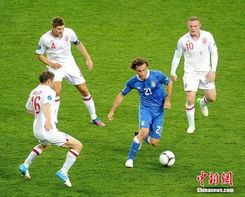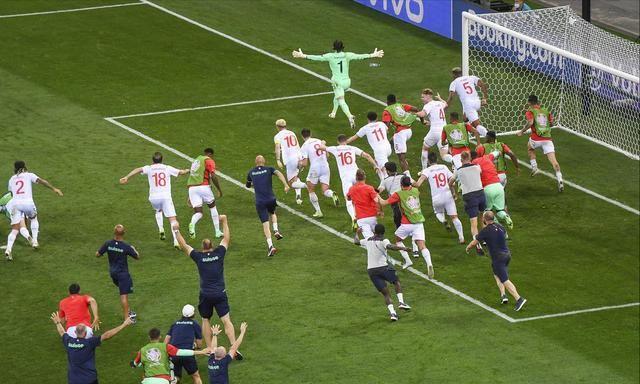TheEvolutionandImpactoftheUEFAEuropeanChampionship:AJourneyThroughTime 文章
Introduction
The UEFA European Championship, often referred to as the Euros, is one of the most prestigious football tournaments in the world, second only to the FIFA World Cup. This quadrennial event brings together the best national teams from Europe to compete for the coveted Henri Delaunay Trophy. Since its inception in 1960, the tournament has grown in size and stature, reflecting the evolution of European football and its global influence. This article explores the history, milestones, and impact of the European Championship across its numerous editions.
The Inception and Early Years (19601976)

The first European Championship was held in 1960 in France, with only four teams participating in the finals. The tournament was a modest affair compared to the grand spectacles of today, but it marked the beginning of a new era in European football. The Soviet Union emerged as the inaugural champions, defeating Yugoslavia in the final. Over the next few editions, the tournament expanded, and by 1976, the final tournament featured eight teams. This period saw the dominance of teams like Italy, Spain, and Germany, setting the stage for future rivalries and narratives.
Expansion and Popularity (19801996)
The 1980s and 1990s witnessed significant changes in the format and popularity of the Euros. In 1980, the final tournament was expanded to include eight teams, and the group stage was introduced. This format allowed for more competitive matches and increased the tournament's appeal. The 1996 edition in England marked another milestone with the expansion to 16 teams, reflecting the growing interest and participation in European football. This period also saw the emergence of new champions like Denmark and the Czech Republic, adding to the tournament's unpredictability and excitement.
Modern Era and Global Impact (2000Present)
The turn of the century brought further innovations and global recognition to the Euros. The 2000 tournament, cohosted by Belgium and the Netherlands, was a showcase of footballing excellence and fan engagement. The introduction of cohosting arrangements opened new possibilities for tournament organization and fan experience. The 2016 edition in France saw the most significant expansion yet, with 24 teams participating in the finals. This expansion allowed more nations to compete at the highest level, enhancing the tournament's inclusivity and appeal.
Impact on Football and Society
Beyond the pitch, the European Championship has had profound impacts on football and society. It has been a platform for political statements, cultural exchanges, and economic boosts for host nations. The tournament has also influenced the development of football tactics and player development across Europe. Moreover, it has played a crucial role in shaping the identities and aspirations of nations, fostering a sense of unity and pride among fans.
Conclusion
As the UEFA European Championship continues to evolve, it remains a testament to the passion, skill, and diversity of European football. Each edition brings new stories, heroes, and memories, enriching the tapestry of world football. The tournament's journey from a smallscale event to a global spectacle reflects the growth and influence of European football on the world stage. As fans eagerly await each new edition, the Euros continue to inspire and unite, embodying the spirit of the beautiful game.
This comprehensive overview of the UEFA European Championship highlights its historical significance, format changes, and the profound impact it has had on football and society. As the tournament prepares for its next edition, it stands as a celebration of European football's past, present, and future.
体育资讯
MORE>-
09-20🔥世界杯前瞻,实力对决还是激情风暴?五大热门球队深度解析与预测🌟
-
09-20希腊新星崛起,科斯塔库弗斯,重塑现代中锋的模板!
-
09-20揭秘!2022年中国男篮全面赛程大曝光,三大挑战与机遇并存
-
09-20狗狗提前8分钟预感地震,狂吠提醒主人的温馨时刻
-
09-20激战上海滩!上海申花VS广州恒大,绿茵对决,谁主沉浮?
-
09-20地震中的勇敢5岁男孩,救小猫的英勇之旅
-
09-20火拼雷霆!骑士铁血捍卫主场,雷霆新星对决詹姆斯的挑战
-
09-20回顾激战,2015年国王杯决赛的巅峰对决,荣耀与梦想交织的足球史诗
-
09-20激战牛城!火箭vs小牛,休斯顿复仇之战,巨头对决引领风暴!
-
09-20体图:药厂已列阿隆索替代者候选,明夏重建将靠维尔茨上亿转会费
-
09-20西甲风云武磊闪耀!西甲大名单发布,留洋新星期待闪耀新赛季
-
09-20罗体:因加蒂受伤,对阵那不勒斯时莫塔将让达尼洛首发出场
-
09-20女子双子宫怀龙凤胎,一边各住一个的传奇故事
-
09-202020欧冠八强激战,谁能问鼎欧洲之巅?——深度解析四场重量级对决
-
09-20台企金阿波罗老板被检方约谈事件
- 搜索
- 最近发表
-
- 🔥世界杯前瞻,实力对决还是激情风暴?五大热门球队深度解析与预测🌟
- 希腊新星崛起,科斯塔库弗斯,重塑现代中锋的模板!
- 揭秘!2022年中国男篮全面赛程大曝光,三大挑战与机遇并存
- 大熊猫丁丁在动物园扑倒饲养员事件引发广泛关注
- 惋惜!执教过莎娃桑普拉斯达文波特的名教头去世,享年岁
- 干姐的奶水,体育世界的隐秘角落与伦理挑战
- 狗狗提前8分钟预感地震,狂吠提醒主人的温馨时刻
- 老师挪用学杂费买彩票事件
- 聚焦体育盛事热血青春,江西力量——探析江西本土体育文化的崛起与未来
- 泽林斯基:我们本可能战胜世界最强球队之一,很高兴完成欧冠首秀
- 激战上海滩!上海申花VS广州恒大,绿茵对决,谁主沉浮?
- 地震中的勇敢5岁男孩,救小猫的英勇之旅
- 欧冠首轮四大战役:豪门对决,黑马逆袭,谁将笑傲欧罗巴?
- 劳塔罗俱乐部和国家队连续场未进球,上次破门是美洲杯决赛
- 宁泽涛,泳坛闪耀的瞬间,退役背后的坚韧与抉择
- 出走的决心,近十年最佳女性题材影片
- 火拼雷霆!骑士铁血捍卫主场,雷霆新星对决詹姆斯的挑战
- 湖南一男子被同学驾车反复碾压致死
- 回顾激战,2015年国王杯决赛的巅峰对决,荣耀与梦想交织的足球史诗
- 男子60元买螃蟹20元是绳的故事
- 标签列表
-
- 世界杯和欧洲杯哪个含金量高 (9)
- 欧洲杯一共多少球队 (11)
- 2024欧洲杯主办城市 (12)
- 2024欧洲杯比赛时间 (19)
- 欧洲杯在哪竞猜 (13)
- 欧洲杯哪只球队先开球 (11)
- 欧洲杯哪个球队身价最高 (10)
- 欧洲杯有多少只球队参加 (15)
- 参加欧洲杯最多的球员 (11)
- 欧洲杯为什么没有直播 (13)
- 2024欧洲杯百度百科 (14)
- 欧洲杯哪个队最有可能进决赛 (11)
- 2024年欧洲杯预选赛 (16)
- 欧洲杯为什么没有中国 (12)
- 欧洲杯共多少场比赛 (12)
- 欧洲杯都有哪些球队参加 (10)
- 2024欧洲杯参赛队伍有多少个 (10)
- 在哪里可以看欧洲杯预选赛 (13)
- 欧洲杯一场比赛时间多长 (10)
- 欧洲杯参赛球队有几支 (11)
- 欧洲杯一场多少人 (11)
- 直播app (10)
- 直播吧 (18)
- 直播吧官网 (11)
- 直播 (11)




